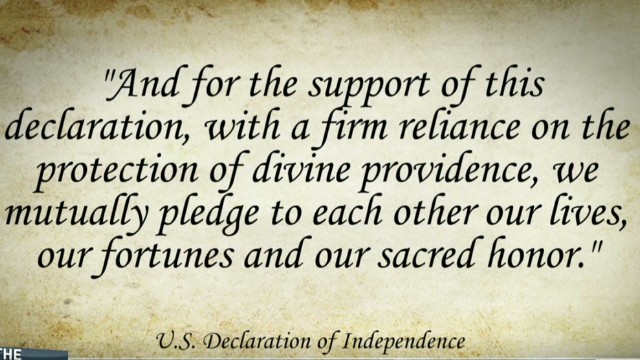On this day of celebrating our independence, I think it is well to remember its cost. The men who led what the Declaration calls the “united States” (note the capitalization) into rebellion pledged their lives, their fortunes, and their sacred honor to create a new thing on earth: a political state based on the ideals of liberty and justice for all. There is a heaviness on my heart about the way we conduct ourselves today as stewards of their creation. The greatest struggle that has been the labor of our nation has been the development of unity out of diversity. President Washington, on leaving office, after experiencing the destructiveness of partisanship in his own cabinet, warned Americans to safeguard their unity. His Farewell Address contains this observation,
The unity of government which constitutes you one people is also now dear to you. It is justly so, for it is a main pillar in the edifice of your real independence, the support of your tranquility at home, your peace abroad; of your safety; of your prosperity; of that very liberty which you so highly prize. But as it is easy to foresee that … much pains will be taken … to weaken in your minds the conviction of this truth…. [I]t is of infinite moment that you should properly estimate the immense value of your national union to your collective and individual happiness; that you should cherish a cordial, habitual, and immovable attachment to it; accustoming yourselves to think and speak of it as of the palladium of your political safety and prosperity; watching for its preservation with jealous anxiety; discountenancing whatever may suggest even a suspicion that it can in any event be abandoned; and indignantly frowning upon the first dawning of every attempt to alienate any portion of our country from the rest, or to enfeeble the sacred ties which now link together the various parts.
He goes on to counsel against the poison of what he calls “party,”
One of the expedients of party to acquire influence within particular districts is to misrepresent the opinions and aims of other districts. You cannot shield yourselves too much against the jealousies and heartburnings which spring from these misrepresentations; they tend to render alien to each other those who ought to be bound together by fraternal affection.…Let me now take a more comprehensive view, and warn you in the most solemn manner against the baneful effects of the spirit of party generally.This spirit, unfortunately, is inseparable from our nature, having its root in the strongest passions of the human mind. It exists under different shapes in all governments, more or less stifled, controlled, or repressed; but, in those of the popular form, it is seen in its greatest rankness, and is truly their worst enemy.The alternate domination of one faction over another, sharpened by the spirit of revenge, natural to party dissension, which in different ages and countries has perpetrated the most horrid enormities, is itself a frightful despotism. But this leads at length to a more formal and permanent despotism. The disorders and miseries which result gradually incline the minds of men to seek security and repose in the absolute power of an individual; and sooner or later the chief of some prevailing faction, more able or more fortunate than his competitors, turns this disposition to the purposes of his own elevation, on the ruins of public liberty.Without looking forward to an extremity of this kind (which nevertheless ought not to be entirely out of sight), the common and continual mischiefs of the spirit of party are sufficient to make it the interest and duty of a wise people to discourage and restrain it.It serves always to distract the public councils and enfeeble the public administration. It agitates the community with ill-founded jealousies and false alarms, kindles the animosity of one part against another, foments occasionally riot and insurrection. It opens the door to foreign influence and corruption, which finds a facilitated access to the government itself through the channels of party passions. Thus the policy and the will of one country are subjected to the policy and will of another.There … being constant danger of excess, the effort ought to be by force of public opinion, to mitigate and assuage [the spirit of party]. A fire not to be quenched, it demands a uniform vigilance to prevent its bursting into a flame, lest, instead of warming, it should consume. Farewell Address, 19 September 1796
As we know Americans did not heed this warning, and we can now see where it has led us. Somehow the Founders were able to devise a system that has been able to survive the storms of partisan passions. In 1954, in another time of fear and division, broadcaster Edward R. Murrow observed, “We will not be driven by fear into an age of unreason, if we dig deep into our own history and our doctrine and remember that we are not descended from fearful men, not men who feared to write, to speak, to associate, and to defend causes which were for the moment unpopular.”
It is in this spirit that on Independence Day I am drawn to the following portrayal of the Continental Congress deciding to sever ties with the Crown, an act for which they submitted themselves to the danger of hanging for treason. I think this scene masterfully conveys the gravity of the moment.
I pray that we may have the courage to preserve what they had the courage to create.

